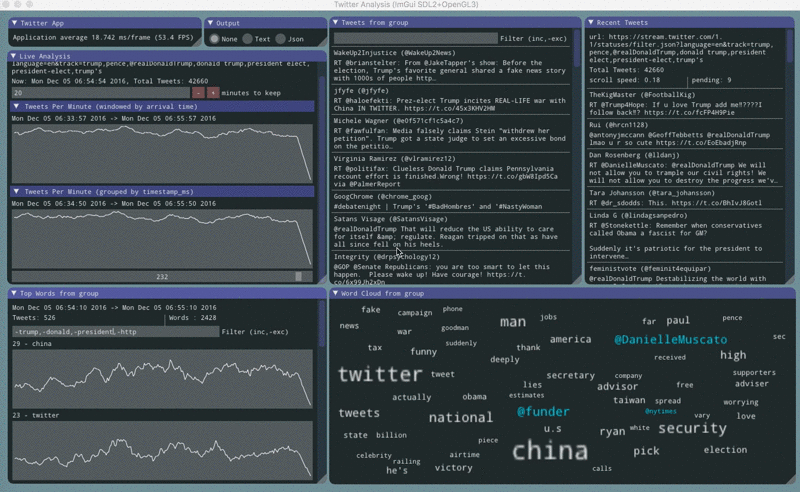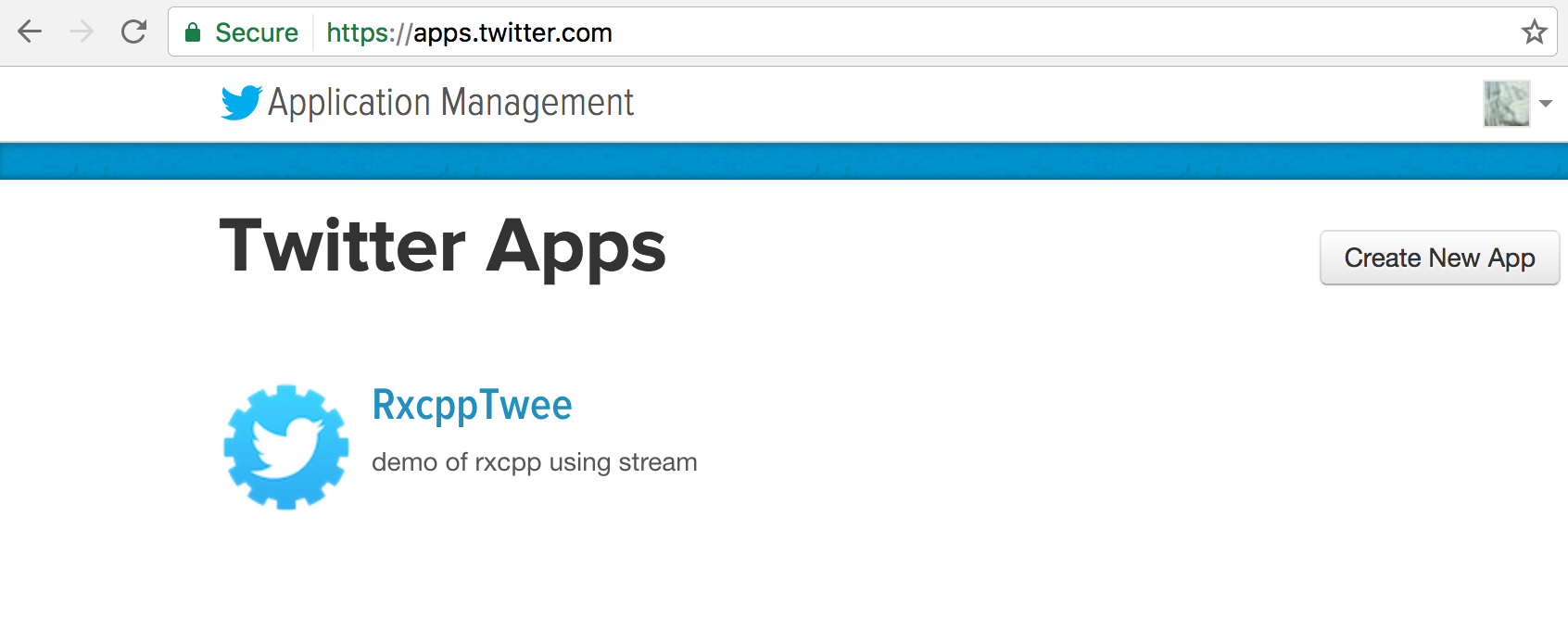Calling the twitter stream API
twitter analysis application
The code for the application is on github. I develop and test this application on OS X, but I chose all the dependencies to make it likely to work on other platforms with minimum effort. On OS X I was able to brew install some dependencies and use CMake to install others.
twitter stream API
I found this c++ gist that calls the twitter stream api.
To use it I had to go to the twitter site and create an app.
Once created, the twitter application will have:
- Consumer Key (API Key)
- Consumer Secret (API Secret)
- Access Token
- Access Token Secret
These are required to use oauth to sign the URL for the stream api call. I made these commandline arguments for the twitter analysis application.
twitterrequest
This function signs the url and calls the twitter stream api.
The keys are used to call oauth_sign_url2, which returns the signed url.
signedurl = oauth_sign_url2(
URL.c_str(), NULL, OA_HMAC, method.c_str(),
CONS_KEY.c_str(), CONS_SEC.c_str(), ATOK_KEY.c_str(), ATOK_SEC.c_str()
);
The signed url and method are used to create an http request. The result will emit the strings from the body as they arrive. The request will not start until subscribe() is called on the request.
return factory.create(http_request{url, method}) |
rxo::map([](http_response r){
return r.body.chunks;
}) |
Emiting the strings as they arrive is a requirement for the http library used to call the twitter stream api. The stream api returns \r\n delimited json documents, but never completes.
the complete function
auto twitterrequest = [](observe_on_one_worker tweetthread, ::rxcurl::rxcurl factory, string URL, string method, string CONS_KEY, string CONS_SEC, string ATOK_KEY, string ATOK_SEC){
return observable<>::defer([=](){
string url;
{
char* signedurl = nullptr;
RXCPP_UNWIND_AUTO([&](){
if (!!signedurl) {
free(signedurl);
}
});
signedurl = oauth_sign_url2(
URL.c_str(), NULL, OA_HMAC, method.c_str(),
CONS_KEY.c_str(), CONS_SEC.c_str(), ATOK_KEY.c_str(), ATOK_SEC.c_str()
);
url = signedurl;
}
return factory.create(http_request{url, method}) |
rxo::map([](http_response r){
return r.body.chunks;
}) |
merge(tweetthread);
}) |
twitter_stream_reconnection(tweetthread);
};
The defer ensures that a completely new http request is made each time subscribe() is called on the result.
At one point, there there was a bug where the same signed url was being reused for reconnects. Putting the signing into the defer fixed this, since each new request got a newly signed url.
twitter_stream_reconnection
This function implements the twitter stream etiquette.
Create a timeout error if nothing has arrived for 90 seconds. The twitter stream api is supposed to send at least an empty line every 30 seconds.
timeout(seconds(90), tweetthread) |
Timeout errors should reconnect immediately.
empty<string>()completes immediately. When the stream completesrepeat()re-subscribes to thedeferabove, which starts a new request.
catch (const timeout_error& ex) {
cerr << "reconnecting after timeout" << endl;
return observable<>::empty<string>();
}
After a TCP error, reconnect immediately.
case errorcodeclass::TcpRetry:
cerr << "reconnecting after TCP error" << endl;
return observable<>::empty<string>();
After a recoverable http error, wait 5 seconds and then reconnect.
timer()emits a long, but this is a stream ofstring.stringandignore()converts to the correct type.
case errorcodeclass::ErrorRetry:
cerr << "error code (" << ex.code() << ") - ";
case errorcodeclass::StatusRetry:
cerr << "http status (" << ex.httpStatus() << ") - waiting to retry.." << endl;
return observable<>::timer(seconds(5), tweetthread) | stringandignore();
When the server is limiting our access, wait 1 minute and then reconnect.
case errorcodeclass::RateLimited:
cerr << "rate limited - waiting to retry.." << endl;
return observable<>::timer(minutes(1), tweetthread) | stringandignore();
Unrecoverable errors do not reconnect.
return observable<>::error<string>(ep, tweetthread);
the complete function
auto twitter_stream_reconnection = [](observe_on_one_worker tweetthread){
return [=](observable<string> chunks){
return chunks |
// https://dev.twitter.com/streaming/overview/connecting
timeout(seconds(90), tweetthread) |
on_error_resume_next([=](std::exception_ptr ep) -> observable<string> {
try {rethrow_exception(ep);}
catch (const http_exception& ex) {
cerr << ex.what() << endl;
switch(errorclassfrom(ex)) {
case errorcodeclass::TcpRetry:
cerr << "reconnecting after TCP error" << endl;
return observable<>::empty<string>();
case errorcodeclass::ErrorRetry:
cerr << "error code (" << ex.code() << ") - ";
case errorcodeclass::StatusRetry:
cerr << "http status (" << ex.httpStatus() << ") - waiting to retry.." << endl;
return observable<>::timer(seconds(5), tweetthread) | stringandignore();
case errorcodeclass::RateLimited:
cerr << "rate limited - waiting to retry.." << endl;
return observable<>::timer(minutes(1), tweetthread) | stringandignore();
case errorcodeclass::Invalid:
cerr << "invalid request - exit" << endl;
default:
return observable<>::error<string>(ep, tweetthread);
};
}
catch (const timeout_error& ex) {
cerr << "reconnecting after timeout" << endl;
return observable<>::empty<string>();
}
catch (const exception& ex) {
cerr << ex.what() << endl;
terminate();
}
catch (...) {
cerr << "unknown exception - not derived from std::exception" << endl;
terminate();
}
return observable<>::error<string>(ep, tweetthread);
}) |
repeat(0);
};
};
With this we get a stream of strings that contain \r\n delimited json documents.

